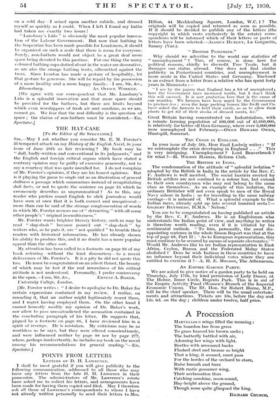POINTS FROM LETTERS
LETTERS OF D. H. LAWRENCE.
I shall be most grateful if you will give publicity to the following communication, addressed to all those who may have any letters from the late D. H. Lawrence in their possession. The administrators of Mr. Lawrence's estate have asked me to collect his letters, and arrangements have been made for having them copied and filed. May I therefore ask all those of Lawrence's correspondents to whom I have not already written personally to send their letters to Mrs. Hilton, 44 Mecklenburg Square, London, W.C. 1? The originals will be copied and returned as soon as possible. If it should be decided to publish any of the letters (the copyright in which vests exclusively in the estate) corre- spondents will be informed which of their letters or parts of letters have been selected.—ALDOUS HUXLEY, La Gorguette, Sanary (Var.).
"BRITISH PESSIMISM."
Why should we advertise to the world our statistics of " unemployment " ? This, of course, is done here for political reasons, chiefly to discredit Free Trade, but it damages our status abroad. One does not find similar publicity in Protectionist countries, and unemployment is more acute in the United States and Germany. Enclosed is an extract from a letter from a relative who has spent forty years in Minnesota :—
" I see by the papers that England has a lot of unemployed ; here the Government have increased tariffs, but I don't think this will succeed. It is over production here that is the cause of our troubles. We farmers have been urged by the Government to produce less ; even the large packing houses like Swift and Co. have asked the farmers to hold their cattle, so as to allow their plants to got rid of their stocks of dressed meats, &c."
Great Britain having concentrated on Industrialism, with a minute farming population of 800,000 out of 45,000,000, is relatively far better off than Germany, where over 3,000,000 were unemployed last February.—OwEN HowanD OWEN, Huntspill, Somerset.
TUE Cnists ix ENGLAND.
In your issue of July 5th, Herr Emil Ludwig writes : "If we contemplate the crisis developing in England . . ." This is very intriguing. Unemployment? Lord Beaverbrook ? Or what ?—H. WILSON HARRIS, Reform Club.
THE BRITISH IN INDIA.
The condemnation of the attitude of "splendid isolation" adopted by the British in India in the article by the Rev. C. F. Andrews is well merited. The social barriers erected by British settlers are not confined to a colour bar, but extend to their own countrymen who may not belong to the same class as themselves. As an example of this isolation, the ordinary Britisher will not even speak to men of the Royal Navy ashore in India ; as for travelling in the same railway carriage—it is unheard of. What a splendid example to the Indian races, already split up into several hundred sects !--• GILBERT REYNOLDS, H.M.S. Nelson.'
You are to be congratulated on having published an article by the Rev. C. F. Andrews. He is an Englishman who understands the Indian point of view, and anything he writes is therefore worth reading, even if it is vitiated by his sentimental outlook. "To him, personally, the most dis- appointing sentence in the whole Simon Report was that at the top of page 68, Part II: 'As to European representation, this must continue to be secured by means of separate electorates.'" Would Mr. Andrews like to see Indian representation in East Africa, Ceylon, Burma and the Federated Malay States abolished ? Does he wish Indians in these countries to have no influence beyond their individual votes where they are entitled to exercise it ?—A. H. E. Mcmsox, The Athenaeum.
AN EMPIRE GARDEN PARTY.
We are asked to give notice of a garden party to be held on Thursday, July 17th, by kind permission of Lady Dance, at The Hohne, Inner Circle, Regents Park. This is in aid of the Empire Activity Fund (Women's Branch of the Imperial Economic Union). The Rt. Hon. Sir Robert Horne, M.P., will be the chief speaker. There will be the usual entertain- ments and attractions. Tickets are 10s. before the day and 12s. 6d. on the day ; children under twelve, half price.




































 Previous page
Previous page